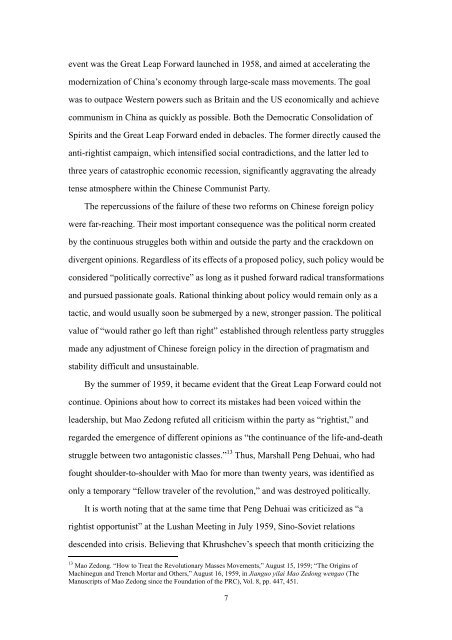1962: The Eve of the Left Turn in China's Foreign Policy - Claude Arpi
1962: The Eve of the Left Turn in China's Foreign Policy - Claude Arpi
1962: The Eve of the Left Turn in China's Foreign Policy - Claude Arpi
Create successful ePaper yourself
Turn your PDF publications into a flip-book with our unique Google optimized e-Paper software.
event was <strong>the</strong> Great Leap Forward launched <strong>in</strong> 1958, and aimed at accelerat<strong>in</strong>g <strong>the</strong>modernization <strong>of</strong> Ch<strong>in</strong>a’s economy through large-scale mass movements. <strong>The</strong> goalwas to outpace Western powers such as Brita<strong>in</strong> and <strong>the</strong> US economically and achievecommunism <strong>in</strong> Ch<strong>in</strong>a as quickly as possible. Both <strong>the</strong> Democratic Consolidation <strong>of</strong>Spirits and <strong>the</strong> Great Leap Forward ended <strong>in</strong> debacles. <strong>The</strong> former directly caused <strong>the</strong>anti-rightist campaign, which <strong>in</strong>tensified social contradictions, and <strong>the</strong> latter led tothree years <strong>of</strong> catastrophic economic recession, significantly aggravat<strong>in</strong>g <strong>the</strong> alreadytense atmosphere with<strong>in</strong> <strong>the</strong> Ch<strong>in</strong>ese Communist Party.<strong>The</strong> repercussions <strong>of</strong> <strong>the</strong> failure <strong>of</strong> <strong>the</strong>se two reforms on Ch<strong>in</strong>ese foreign policywere far-reach<strong>in</strong>g. <strong>The</strong>ir most important consequence was <strong>the</strong> political norm createdby <strong>the</strong> cont<strong>in</strong>uous struggles both with<strong>in</strong> and outside <strong>the</strong> party and <strong>the</strong> crackdown ondivergent op<strong>in</strong>ions. Regardless <strong>of</strong> its effects <strong>of</strong> a proposed policy, such policy would beconsidered “politically corrective” as long as it pushed forward radical transformationsand pursued passionate goals. Rational th<strong>in</strong>k<strong>in</strong>g about policy would rema<strong>in</strong> only as atactic, and would usually soon be submerged by a new, stronger passion. <strong>The</strong> politicalvalue <strong>of</strong> “would ra<strong>the</strong>r go left than right” established through relentless party strugglesmade any adjustment <strong>of</strong> Ch<strong>in</strong>ese foreign policy <strong>in</strong> <strong>the</strong> direction <strong>of</strong> pragmatism andstability difficult and unsusta<strong>in</strong>able.By <strong>the</strong> summer <strong>of</strong> 1959, it became evident that <strong>the</strong> Great Leap Forward could notcont<strong>in</strong>ue. Op<strong>in</strong>ions about how to correct its mistakes had been voiced with<strong>in</strong> <strong>the</strong>leadership, but Mao Zedong refuted all criticism with<strong>in</strong> <strong>the</strong> party as “rightist,” andregarded <strong>the</strong> emergence <strong>of</strong> different op<strong>in</strong>ions as “<strong>the</strong> cont<strong>in</strong>uance <strong>of</strong> <strong>the</strong> life-and-deathstruggle between two antagonistic classes.” 13 Thus, Marshall Peng Dehuai, who hadfought shoulder-to-shoulder with Mao for more than twenty years, was identified asonly a temporary “fellow traveler <strong>of</strong> <strong>the</strong> revolution,” and was destroyed politically.It is worth not<strong>in</strong>g that at <strong>the</strong> same time that Peng Dehuai was criticized as “arightist opportunist” at <strong>the</strong> Lushan Meet<strong>in</strong>g <strong>in</strong> July 1959, S<strong>in</strong>o-Soviet relationsdescended <strong>in</strong>to crisis. Believ<strong>in</strong>g that Khrushchev’s speech that month criticiz<strong>in</strong>g <strong>the</strong>13 Mao Zedong. “How to Treat <strong>the</strong> Revolutionary Masses Movements,” August 15, 1959; “<strong>The</strong> Orig<strong>in</strong>s <strong>of</strong>Mach<strong>in</strong>egun and Trench Mortar and O<strong>the</strong>rs,” August 16, 1959, <strong>in</strong> Jianguo yilai Mao Zedong wengao (<strong>The</strong>Manuscripts <strong>of</strong> Mao Zedong s<strong>in</strong>ce <strong>the</strong> Foundation <strong>of</strong> <strong>the</strong> PRC), Vol. 8, pp. 447, 451.7

















